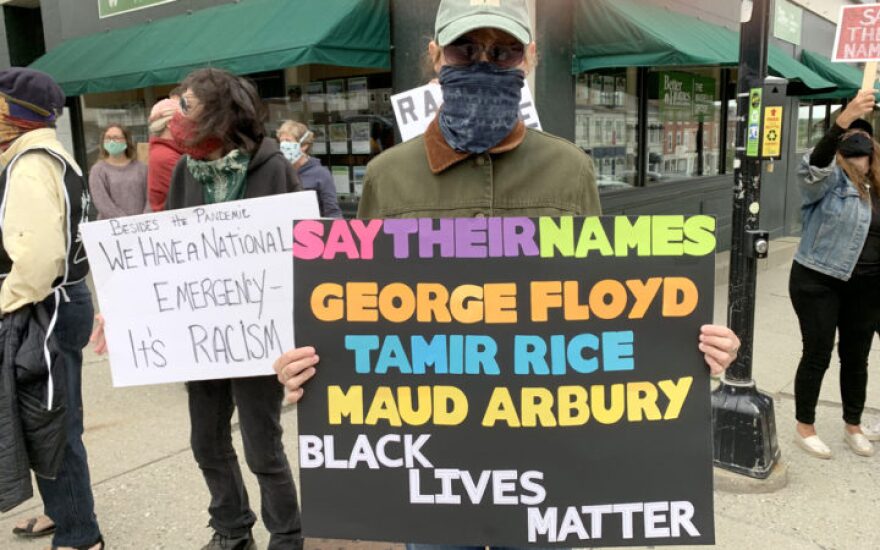Just after noon on Sunday, the First Church in Belfast will ring its bells for 8 minutes and 46 seconds, exactly how long a Minneapolis police officer held his knee on the neck of George Floyd, who was killed in custody on May 25.
The bells can be heard throughout the downtown of this small midcoast city, but protesters will listen for them in one place in particular: the northeast corner of Main and High streets, known locally as Resistance Corner.
Protesters have been gathering there since Sept. 11, 2001 to exercise their First Amendment rights and make their voices heard on a number of issues, especially those pertaining to peace, social justice and the environment. Meredith Bruskin, 72, has spent part of almost every Sunday since 9/11 on the corner, taking a stand against war and injustice.
She’ll be there this week, too.
“It feels like I get a chance to speak the truth at least once a week, in a public way. That’s essential for me,” Bruskin, of Swanville, said. “The corner is as important to me as any other institution.”
The Sunday antiwar vigils grew out of the Peace and Justice Group of Waldo County, which began meeting in the spring of 2001. After the attacks, the group began to take a public stand, according to activist Larry Dansinger, who now lives in Bangor.

“I think probably because of the threat and eventually the war on Afghanistan, we decided to have a regular vigil,” he said.
At first, with most of the country awash in shock and patriotism, the peace activists didn’t feel that their message was popular.
“We got lots of testosterone,” Bruskin said. “There was lots of ramming the gas and yelling, ‘Get a job.’”
Cathy Mink, 87, and a stalwart member of the group, agreed.
“In the beginning, they were quite rude,” she said, adding that it didn’t surprise her. “It’s like bearing witness to truth. A lot of times, truth doesn’t want to be heard among the general population.”
Over the years, as the wars dragged on, the protesters kept coming to raise their signs and their voices in all weather. And the reactions from passersby seemed to change.
“Time marches on, and reveals the cracks of society,” Mink said. “I think consciousness has been raised between the hypocrisy of what America says and what America does.”

The activists get more honks of support and thumbs up, fewer catcalls and engine revving these days, which may or may not be considered a sign of progress.
“In one sense, the vigils are really important, because we need to keep reminding the public of the various problems that exist,” Dansinger said. “In another sense, it’s terribly sad that we need to keep being out there.”
He stopped going after a while, in part because he lived far out of town and it didn’t seem right to use a gallon of gas this way. But others kept on going. The corner has seen at least one “die-in,” a non-violent direct action that came out of the Iraq War, Bruskin said, and on Thursdays in recent years, members of the group Local Citizens for Smart Growth have taken to the corner to register their opposition to Nordic Aquafarms’ proposed land-based salmon farm in Belfast.
And although she stands against police violence, Bruskin said Beflast officers have been supportive of the protests.
“Those of us on the corner have been very grateful, because police have always been fine with us,” she said. “They do not hassle us on the corner.”

When President Donald Trump was elected in November 2016, protesters displayed a big banner with the word “RESIST.”
That’s how the name Resistance Corner really took off, Bruskin said.
“We’re not a partisan group,” she said. “But none of us are for the current administration. We stand for International Women’s Day, we stand against violence against women. We stand for taking children out of cages. We stand against a wall. We stand for peace and kindness and looking at the world in a new way.”
The Sunday vigils were put on pause for the first time at the beginning of the coronavirus pandemic. But they started again two weeks ago, in a response to Black Lives Matter and George Floyd’s death.
Trudy Miller, a community activist who has helped organize local Black Lives Matter demonstrations, said it’s great to have a place as well-known as Resistance Corner available to protesters.
“I think it’s important that there’s a place where people know they can always go,” she said.
Mink, who grew up in Maryland in an atmosphere when racism was overt and pervasive, said that she finds the energy and youth involved in the current protests to be powerful.
“I saw so many young people of all colors coming together in the search for peace and justice,” she said, adding that even though she is approaching 90 she will be there on Sunday. “We are in desperate need of activist people who will bear witness in the street. If you practice that for a long time, it’s almost a natural response. You don’t shy away from it. You have the spark within you to keep other sparks going — and to ignite others.”
This story appears through a media sharing agreement with Bangor Daily News.



